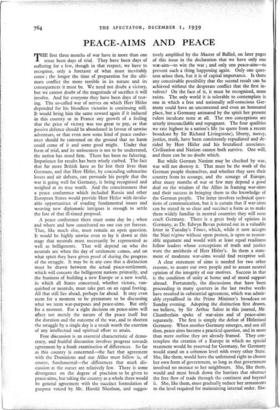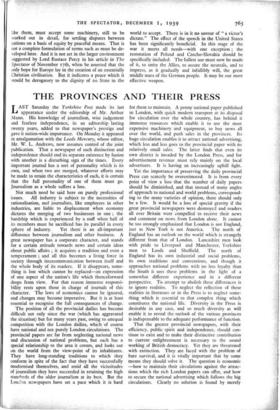PEACE-AIMS AND PEACE
THE first three months of war have in more than one sense been days of trial. They have been days of suffering for a few, though in that respect, we have to recognise, only a foretaste of what must inevitably come ; the longer the time of preparation for the ulti- mate conflict the more terrible in its nature and its consequences it must be. We need not doubt a victory, but we cannot doubt of the magnitude of sacrifice it will involve. And for everyone they have been days of test- ing. The so-called war of nerves on which Herr Hitler depended for his bloodless victories is continuing still. It would bring him the same reward again if it induced in this country or in France any growth of a feeling that the price of victory was too great to pay, or that passive defence should be abandoned in favour of unwise adventure, or that even now some kind of peace confer- ence should be convened on the ground that no harm could come of it and some good might. Under that form of trial, and its seriousness is not to be underrated, the nation has stood firm. There has been no faltering. Impatience for results has been wisely curbed. The fact that far more British have so far lost their lives than Germans, and that Herr Hitler, by concealing submarine losses and air defeats, can persuade his people that the war is going well for Germany, is being recognised and weighed at its true worth. And the consciousness that a peace conference which included Russia and other European States would provide Herr Hitler with invalu- able opportunities of evading fundamental issues and weaving new diplomatic intrigues is enough to settle the fate of that ill-timed proposal.
A peace conference there must some day be ; when and where and how constituted no one can yet foresee. That, like much else, must remain an open question. It would be highly unwise even to lay it down at this stage that neutrals must necessarily be represented as well as belligerents. That will depend on who the neutrals are when the day of settlement comes, and on what spirit they have given proof of during the progress of the struggle. It may be in any case that a distinction must be drawn between the actual peace-settlement, which will concern the belligerent nations primarily, and the business of building a new Europe or a new world, in which all States concerned, whether victors, van- quished or neutrals, must take part on an equal footing. All that still lies ahead, perhaps far ahead. It may even seem for a moment to be premature to be discussing what we term war-purposes and peace-aims. But only for a moment. For a right decision on peace-aims will affect not merely the nature of the peace itself but the duration and the outcome of the war, and to shorten the struggle by a single day is a result worth the exertion of any intellectual and spiritual effort to attain.
Free discussion is an essential characteristic of demo- cracy, and fruitful discussion involves progress towards agreement by a frank examination of differences. So far as this country is concerned—the fact that agreement with the Dominions and our Allies must follow is, of course, fundamental—the differences that mark dis- cussion at the outset are relatively few. There is some divergence on the degree of precision to be given to peace-aims, but taking the country as a whole there would be general agreement with the succinct formulation of purpose voiced by Mr. Harold Nicolson, and sugges- tively amplified by the Master of Balliol, on later pages of this issue in the declaration that we have only one war-aim—to win the war ; and only one peace-aim—to prevent such a thing happening again. Only one ques- tion arises then, but it is of capital importance. Is there any conceivable possibility that the second result can be achieved without the desperate conflict that the first in- volves? On the face of it, it must be recognised, none *exists. The only world it is tolerable to contemplate is one in which a free and nationally self-conscious Ger- many could have an uncontested and even an honoured place, but a Germany animated by the spirit her present rulers inculcate none at all. The two conceptions are utterly irreconcilable and repugnant. The four qualities we rate highest in a nation's life (to quote from a recent broadcast by Sir Richard Livingstone), liberty, mercy, justice, truth, have been consistently repudiated and de- rided by Herr Hitler and his brutalised associates. Civilisation and Nazism cannot both survive. One will, and there can be no doubt which.
But while German Nazism may be checked by war, war will not destroy it. That must be the work of the German people themselves, and whether they save their country from its scourge, and the scourge of Europe, after many months of war or few may depend a good deal on the wisdom of the Allies in framing war-aims and their success in bringing them to the knowledge of the German people. The latter involves technical ques- tions of communication, but it is certain that if war-aims can be stated in so clear and succinct a form as to make them widely familiar in neutral countries they will soon reach Germany. There is a great body of opinion in Germany, as Dr. Edwyn Bevan pointed out in a valuable letter in Tuesday's Times, which, while it now accepts the Nazi regime without open protest, is open to reason- able argument and would with at least equal readiness follow leaders whose conceptions of truth and justice were the antithesis of Herr Hitler's. In them a state- ment of moderate war-aims would find receptive soil.
A clear statement of aims is needed for two other reasons, to assure our own people and to assure neutral opinion of the integrity of our motives. Success in that is the condition of unity at home and of moral support abroad. Fortunately, the discussions that have been proceeding in many quarters in the last twelve weeks have resulted in substantial agreement, which was admir- ably crystallised in the Prime Minister's broadcast on Sunday evening. Adopting the distinction first drawn, we believe, by Sir Arthur Salter in this journal, Mr. Chamberlain spoke of war-aims and of peace-aims separately. The first is simply the defeat of Hitlerised Germany. When another Germany emerges, and not till then, peace aims become a practical question, and in more than mere outline they are already framed. They con- template the creation of a Europe in which no special treatment would be reserved for Germany, for Germany would stand on a common level with every other State. She, like them, would have the unfettered right to choose her own form of government, so long as that government involved no menace to her neighbours. She, like them, would and must break down the barriers that obstruct the free flow of trade through the continent and beyond it. She, like them, must gradually reduce her armaments to the level required for maintaining internal order. She. like them, must accept some machinery, still to be worked out in detail, for settling disputes between nations on a basis of equity by peaceful means. That is not a complete formulation of terms such as must be de- veloped later. And it is not set in the larger environment suggested by Lord Eustace Percy in his article in The Spectator of November 17th, when he asserted that the only hope for Europe lay in the creation of an essentially Christian civilisation. But it indicates a peace which it would be derogatory to the dignity of no State in the world to accept. There is in it no savour of " a victor's dictate." The effect of the speech in the United States has been significantly beneficial. In this stage of the war it meets all needs—with one exception ; the restoration of Poland and Czecho-Slovakia should be specifically included. The fullest use must now be made of it, to unite the Allies, to assure the neutrals, and to impress, as it gradually and infallibly will, the great middle mass of the German people. It may be our most effective weapon.













































 Previous page
Previous page